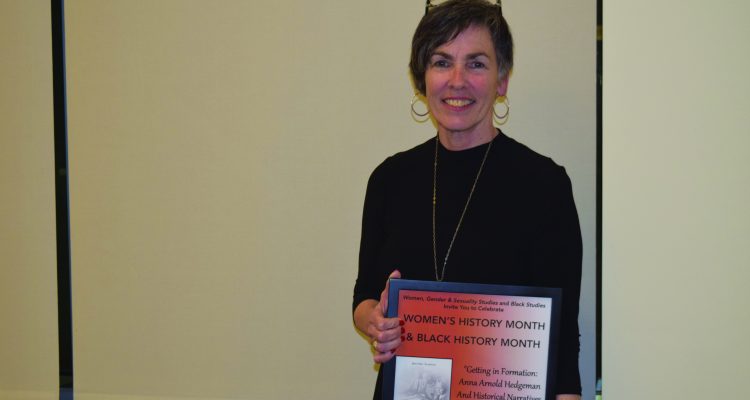The name Anna Arnold Hedgeman is not usually a name that is commonly referred to in the history of civil rights. Through advances in education, public health, politics and workplace justice, Hedgeman led and was a part of some of the 20th century’s most important developments.
With those noble strides came adverse opposition for, according to Professor of History and Black Studies Elizabeth Hohl, Hedgeman is an often overlooked proponent of social justice in the history of the United States.
In light of the current political climate and specifically in honor of both Black History Month and Women’s History Month, the Women, Gender and Sexuality Studies Program in collaboration with the Black Studies Program invited Dr. Jennifer R. Scanlon to give a talk about Hedgeman in the Aloysius P. Kelley Center.
“Hedgeman was a dedicated freedom fighter known for her fight for faith-based activism, civil rights and feminism,” said Hohl, co-director of the event.
Guest speaker Dr. Scanlon is the William R. Kenan, Jr. professor of the humanities in gender, sexuality and women’s studies at Bowdoin College; she is a historian as well as the interim dean of academic affairs at Bowdoin.
Her talk, “Getting in Formation: Anna Arnold Hedgeman and Historical Narratives of Black Women’s Activism,” is based on her new book entitled “Until There is Justice: The Life of Anna Arnold Hedgeman.”
According to Scanlon, Hedgeman helped to organize the 1963 March on Washington for Civil Rights and co-founded the National Organization for Women.
“Scanlon’s treatment restores Hedgeman’s place as a force for change during her long career,” said Hohl.
One of the central points that Scanlon stressed throughout her lecture was how Hedgeman’s critical work on behalf of social and racial justice garnered limited recognition.
“Hedgeman’s work is woven into the fabric of the civil rights movement. Her contribution may not have been recognized publically, but it was real and it was profound,” said Scanlon.
In the conclusion of her lecture, Scanlon put a twist on explaining Hedgeman’s formative efforts and cited the pop song “Formation” by Beyoncé.
Dr. Emily Orlando, associate professor of English, director of the Women, Gender & Sexuality Studies department and co-director of the event addressed the song “Formation” by Beyoncé to connect with Hedgeman’s stoic activism.
“Following Beyoncé’s directive in her memorable song ‘Formation,’ from which Scanlon’s talk takes its title, we would like to think that folks might, from the talk, ‘get information,’ and also ‘get in formation,’ as in, to organize politically, and to bring about positive change,” said Orlando.
Over 50 students and faculty were in attendance at the event, which was made possible by a generous donation from the Humanities Institute.
A student enrolled in Hohl’s “Feminism in the United States” class, Matthew Marshall ‘19, thought Scanlon’s lecture helped to highlight the numerous setbacks African American women face.
“I thought Dr. Scanlon’s speech was a paradigm shift for me in what I had only simply known as Martin Luther King Jr’s ‘I Have a Dream’ speech,” said Marshall.
“She was able to illuminate the life and contributions of Anna Arnold Hedgeman, not only through her work on the march, but the civil rights movement as a whole,” he continued.
The talk was also co-sponsored by the peace and justice studies program, Assistant Dean of Students Allison Berger, public lectures and events and the departments of history, politics, sociology and cultural anthropology.
Junior Casey Fuller, another student in Hohl’s feminism class, thought Scanlon’s lecture and Hedgeman’s activism were both very enlightening.
“I find it remarkable that so many, including myself, are just learning about Hedgeman’s work,” said Fuller.
“Hedgeman is one of the giants upon whose shoulders current activists stand. Many of those activists are perhaps still unaware of her fight for justice,” Fuller added.
According to Scanlon, sometimes standing in formation is a lonely stance; it was for Hedgeman.
Regardless of those differences, Hedgeman’s legacy invites us to demand equality, even when faced with opposition.
“Her work was central in the fight for solidarity and the demand for justice in the future,” said Scanlon.
“She was a black person among whites, a lay person among clergy and most certainly a woman among men,” she continued.
Hedgeman’s critical work was at first forgotten; the cause was not.


Leave a Reply